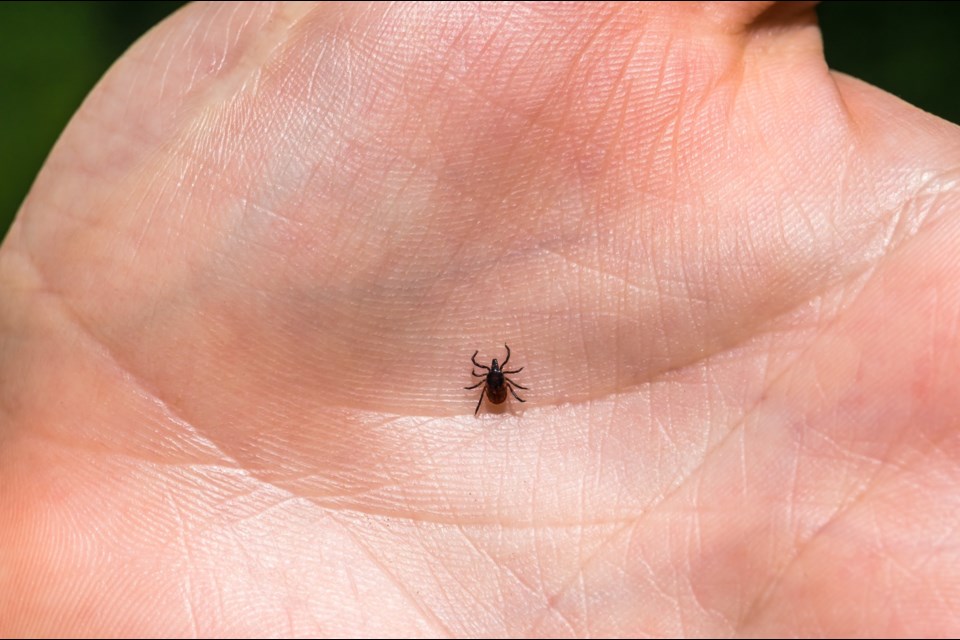MOUNT FOREST ‒ As tick populations continue to increase across Wellington County and Guelph, one local woman living with Lyme disease is sharing her story to raise awareness in the hopes it may prevent others from experiencing it.
Mount Forest resident Christine Wilson-Rowarth was bitten by a nymph black-legged tick at her home in the east of Ottawa while pregnant with her daughter over a decade ago.
After seeing countless specialists, spending thousands of dollars and even undergoing unnecessary gallbladder surgery, Wilson-Rowarth was only diagnosed with Lyme disease five years ago; but by then, the damage was done.
“Lyme disease is a real problem and people need to take it more seriously,” said Wilson-Rowarth, whose 16-year-old daughter has recently begun to show symptoms. “Your life just stops and you have no idea how bad things are about to get.”
The day she was bitten, Wilson-Rowarth remembers “shaking uncontrollably," battling a fever for two days until her energy returned. Wilson-Rowarth thought nothing of the illness until a month later when an aching pain started in her knees and began spreading throughout her body.
“My knees were so sore, like to bend down to gardening, anything that was just so sore,” said Wilson-Rowarth. “And then I would get up in the morning and I would feel like I could just go back to bed… it was like I was carrying bricks.”
According to Public Health Ontario, if Lyme disease is caught early, it can generally be treated successfully before it affects the heart, nervous system, or joints. But when Wilson-Rowarth was bitten, it “wasn’t common” for general practitioners to be familiar with the symptoms of Lyme disease.
“If I’d been given antibiotics at the time, I would’ve been cured,” said Wilson-Rowarth. “My children have never met the healthy version of me and they likely never will.”
Since moving to Mount Forest, Wilson-Rowarth has watched tick populations grow despite limited public measures to thwart them. While she appreciates the increase in public information circulating about the disease, she wishes that she had been aware of how different her life would've been if she'd received treatment at an appropriate time.
“By the time that your body has the bacteria, you look back at your medical reports and stuff you've written down and think gosh, there’s another sign and another symptom,” said WIlson-Rowarth. “But it makes sense; if you leave an infected wound untreated, what do you think's gonna happen? You're gonna end up chopping off that finger … and this is all happening inside my body.”
Similar trends have been seen across Ontario, especially in Ottawa where Wilson-Rowarth was bitten.
Justin Wood, founder of Geneticks, a private lab that tests ticks, says that Wilson-Rowarth’s findings aren’t surprising.
“The number of ticks being encountered in the Wellington-Guelph area is absolutely increasing,” said Wood. “In recent years, I think we've started to see quite a few ticks and a lot of people submitting from the area and,…the public health officer…has had a lot of ticks submitted to them for identification as well.”
According to Wood, eastern and southern parts along the north shore of Lake Ontario have always held the highest concentrations of ticks. But climate change has brought new species of ticks and pathogens not traditionally seen in and around Canada to all parts of the country.
“As climate change allows for warmer temperatures, it means that infected ticks in particular that used to be limited are starting to move into new areas that they weren't in before,” said Wood. “So we might not just start to see an influx of ticks but new ones carrying new diseases as well likely establishing in and around Ontario, including the Wellington-Guelph area.”
Wood also shares Wilson-Rowarth’s sentiment that while tick populations have increased, awareness and vigilance throughout the region have not.
“I think that public awareness hasn’t necessarily kept up with (the increases) and that means that people don’t really know the risks that have come into the area,” said Wood. “There’s been a long-standing thought that there are no ticks and no Lyme disease in the Guelph-Wellington area but that’s changing very, very quickly.”
Wilson-Rowarth believes the government should be doing more to educate and prevent Lyme disease in Canadians.
“They’re still in denial because I think (health professionals) know that there's not a whole lot that can be done about (Lyme),” said Wilson-Rowarth. “The disease will not only ruin your life but those around you and yet really intelligent people are ignorant about it. I really hope that something is done soon to open the government's eyes."
Isabel Buckmaster is the Local Journalism Initiative reporter for GuelphToday. LJI is a federally-funded program.
